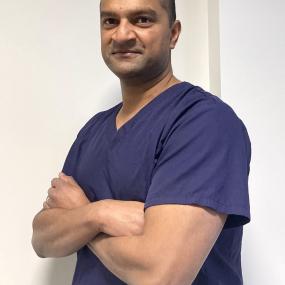FICMEducation 2025: Hot Topics
We are pleased to announce that we will be holding our FICMEducation 2025: Hot Topics online event on 22 May 2025.
Spend a day with us and cover your revalidation and professional needs as an intensivist and educator.
We are pleased to announce that we will be holding our FICMEducation: Hot Topics online event on 22 May 2025.
Topics will include:
- Diagnosing death using neurological criteria
- Maternal Critical Care
- Critical Care Rehab
Spend a day with us and cover your revalidation and professional needs as an intensivist and educator.
We are offering early bird rates for those who book on before 1 March 2025.
Programme
| 09.40-09.50 | Log in | |
| 9.50-10.00 | Welcome and introduction | Dr Sarah Marsh |
| 10.00-10:30 | Assisted Dying | Professor Natalie Pattison |
| 10.30-11.00 | Diagnosing death using neurological criteria - the first 3 months of the 2025 Code |
Dr Dale Gardiner Consultant ICM, Nottingham, Co-chair of the Academy working group who updated the 2025 Code, Nottingham University Hospitals NHS Trust |
| 11.00-11.10 | Q&A session | |
| 11.10-11.25 | Break | |
| 11.25-11.55 | Considerations for intensivists when using AI health technologies |
Dr Joseph Alderman AI & digital health clinical research fellow; speciality registrar in anaesthesia and ICM |
| 11.55–12.25 | Running a CC unit (Smaller units) |
Dr Jack Parry Jones Vice Dean, SSUAG Chair |
| 12.25-12.35 | Q&A session | |
| 12.35-13.20 | Lunch | |
| 13.20-13.50 | Maternal Critical Care |
Dr Charlotte Frise Consultant Obstetric Physician, Imperial College Healthcare NHS Trust |
| 13.50-14.20 | Frailty in Critical Care |
Dr Susannah Leaver Consultant ICU and Respiratory Medicine, St George's University Foundation Trust |
| 14.20-14.30 | Q&A session | |
| 14:30-14.45 | Break | |
| 14.45-15.15 | Cancer Medicine - Recent developments in haematological malignancies and its impact on Intensive care |
Professor Kamaraj Karunanidhi Consultant in Clinical Haematology and R&I Director, University Hospital of North Midlands |
| 15.15-15.45 | Critical Care Rehab - GPICS standards for Rehabilitation and Chronic Critical illness |
Professor Zudin Puthucheary Professor of Intensive Care Medicine, Queen Mary University of London and Barts Health NHS Trust |
| 15.45-15.55 | Q&A session | |
| 15.55-16.00 | Close |
Pricing
| Online | Online early bird discount if booked before 1 March | |
| Members | £140 | £110 |
| Doctors in training, Nurses, ACCPs, Pharmacists | £105 | £85 |
| Senior Fellows & Members | £70 | £55 |
| Core/Foundation trainees | £40 | £40 |
| Non Members | £175 | £140 |
Speakers

Joe is a doctoral research fellow at the University of Birmingham, and a speciality registrar in anaesthesia and ICM. His research focuses on predictive models which are used throughout healthcare – how can we ensure these data-driven tools are safe and effective for everyone? He is one of the leads for the STANDING Together initiative, creating international recommendations to improve the way data is selected and used to create AI health technologies. STANDING Together is a collaboration between stakeholders from 58 countries, including medical device regulators, research funders, policy organisations and academic institutions. Joe is also co-organiser of the Alan Turing Institute’s Clinical AI interest group, and co-lead for the Participatory Research Theme at Data Science for Health Equity (DSxHE).
Learning outcomes:
- What questions should intensivists be asking before using AI health technologies in their practice?
- How is the wider NHS working to ensure these tools are safe, effective, and equitable?

Charlotte Frise is a consultant Obstetric Physician and is Lead Obstetric Physician for the NW London Maternal Medicine network. She is a senior college lecturer in Clinical Medicine at Keble College, Oxford and honorary senior clinical lecturer at Imperial College London. She is co-editor-in-chief of the journal Obstetric Medicine. She has also recently authored two textbooks: Obstetric Medicine, in the Oxford Specialist Handbooks in Obstetrics and Gynaecology series and Case Histories in Obstetric Medicine.
Learning outcomes:
- Physiological changes in pregnancy
- Why pregnant and recently delivered women may require critical care support
- Effects of pregnancy on interventions
- Factors affecting decisions about delivery

Dr Dale Gardiner is a Consultant in Adult Intensive Care Medicine at Nottingham University Hospitals NHS Trust and the Associate Medical Director – Deceased Organ Donation at NHS Blood and Transplant.
His professional interests are medical ethics, the diagnosis of death and deceased organ donation.
Dale is a Board Member of the Faculty of Intensive Care Medicine and Chair of the Professional Affairs and Safety Committee. He is co-chair of the Academy of Medical Royal Colleges task and finish group to update the 2008 Code of Practice for the Diagnosis and Confirmation of Death.
Originally, Dale came from Australia but migrated to the UK in 2002.

Professor Kamaraj Karunanithi is a highly accomplished medical professional with a robust academic background and extensive experience in haematology/oncology. He earned his qualifications with an MRCP from the Royal College of Physicians, London, and later achieving Fellowship of the Royal College of Pathology and Royal College of Physicians.
Throughout his career, he has held several significant appointments
- Consultant Haematologist at the University Hospital of North Midlands NHS Trust,
- Lead Clinician for Myeloma
- Previously as Clinical Director of Haematology and Oncology
- Now Director of Research and Innovation and Director of North Midlands Commercial Research Delivery Centre
I have a special interest in Myeloma and plasma cell disorders, and has contributed significantly to the field, including authoring a best practice paper on MGUS diagnosis and monitoring. Professor Karunanithi serves Chief and Principal Investigator for various national and international clinical trials. He also sits on multiple pharmaceutical company advisory boards, where he advises on clinical trials, commercialization, and optimizing new treatments within the NHS. His expertise and leadership continue to advance the field of haematology on a wider scale.
His leadership continues to develop and improve research and development UK by part of UKRD leadership team support UK wide research infrastructure.
Learning outcomes:
- Recent advances in Haematological cancers
- Management of Sepsis and intensive care support
- Novel treatments and newer side effects – Cytokine release syndrome and ICANS

Susannah Leaver is a critical care and respiratory consultant at St George's Hospital in London and Directorate lead for critical care research. She is the chair of the HSRO section of the European Society of Intensive Care Medicine and part of the VIP (Very Old Intensive care Patient) network. Her PhD was on sepsis and the inflammatory response. Her current main research interest is the management of elderly patients in the ICU with a particular focus on frailty.
Learning outcomes:
- What is frailty, how to measure it and how it effects outcome in elderly ICU patients
- Which elderly patients benefit from ICU
- The role of a time limited trial

Professor Natalie Pattison is a clinical academic who has worked clinically in cancer, critical care and critical care outreach. She is a Professor of Clinical Nursing with a joint appointment across the University of Hertfordshire and East and North Herts NHS Trust (ENHT). Natalie also holds a Researcher in Residence (ICU) position at Imperial College London, working in the CATO team, with an honorary contract with Imperial College Healthcare NHS Trust. She is the clinical lead for the critical care follow-up service at ENHT, combining this with a research role. Her research interests focus on her clinical area of critical care and critically ill ward patients, end of life in critical care, disability in critical care, and workforce in critical care. She is widely published in critical care. She is Chair of the National Outreach Forum, past-Chair of both the UK Critical Care Research Group, and immediate past-Chair of UK Critical Care Nursing Alliance. She is also Deputy Lead for the National Institute for Health Research National Specialty Group for Critical Care.

Zudin Puthucheary is a Professor of Intensive Care Medicine at the William Harvey Institute, Queen Mary, University of London, and a Consultant at the Royal London Hospital Adult Intensive Care Unit. He graduated from Nottingham University in 1997, and moved to London post MRCP in 2000. Following a 3-year stint in Sydney, he started his Respiratory training in Bristol, before completing his critical care training in London. His research focusses on acquired functional disability and skeletal muscle physiology, and specifically the use of metabolic and exercise interventions to prevent and treat acute muscle wasting. He is a nationally elected Council member of the Intensive Care Society (UK) and was the inaugural chair of the UK National Post-Intensive Care Rehabilitation Collaborative, a multi-professional cross-disciplinary group focussing on rehabilitation and restitution of critical illness survivors. He is the Chief Investigator of the ASICS-II and ASICS-TBI trials, investigating the efficacy of ketogenic feeding in preventing muscle wasting and secondary brain injury.
Learning outcomes:
- To understand the background and rationale of the GPICS chapter on rehabilitation and implications for practise
- Understand the background and rationale of the GPICS chapter on Chronic Critical Illness and implications for practise
